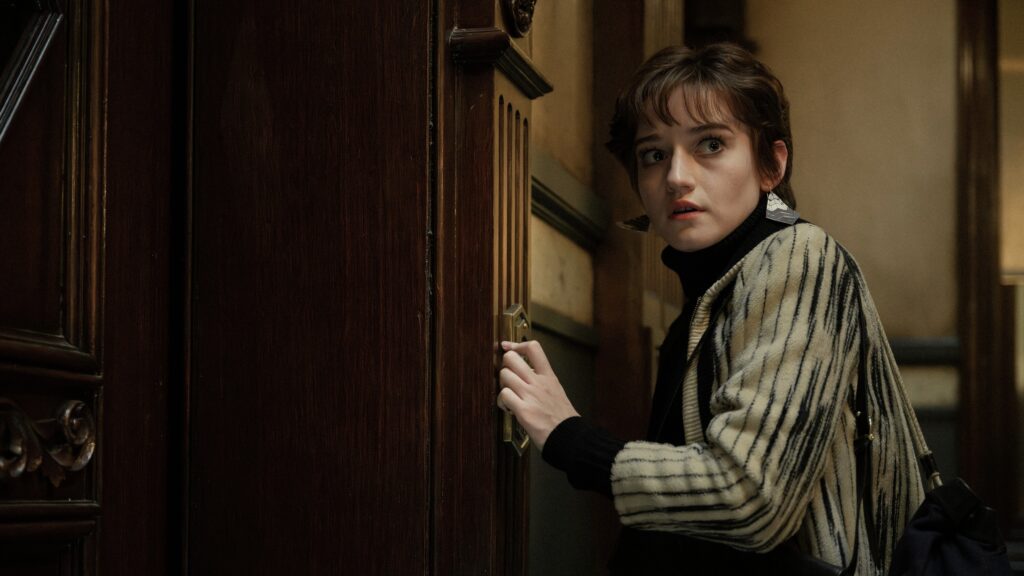Horror prequels are in vogue right now, with The First Omen, A Quiet Place: Day One, and Saw X all proving surprise hits with horror fans. Enter Apartment 7A, which takes a big risk in attempting to recapture the haunting power that Rosemary’s Baby (1968) continues to hold half a century on. That’s just about the only risk the film is willing to take, but that doesn’t mean it’s not worth visiting.
Exploring Natalie Erika James’ Vision for Apartment 7A
Apartment 7A is directed by Natalie Erika James, who also penned the script alongside her Relic co-writer Christian White and Skylar James. The film follows Terry Gionoffrio (Julia Garner), the character played briefly by Victoria Vetri in the original film, who Rosemary and her husband found dead outside their apartment building, having seemingly jumped to her death.
That places Apartment 7A in something of a predicament: we know going in that Terry isn’t going to make it to the end credits. There’s still room for invention there — it was clear from the outset of The First Omen that our intrepid lead wasn’t going to prevent the birth of the Antichrist. But where that film turned the insanity dial up to 11 to keep audiences engaged, Apartment 7A is content to play things a little safe.
Julia Garner’s Performance Grounds the Horror
Garner still gives it her all as dancer Terry, tears shining behind her wide, determined, yet increasingly dispirited eyes as she pushes herself through audition after agonizing audition following a devastating injury on stage. She’s taken in by Minnie and Roman Castevet (played this time around by Dianne Wiest and Kevin McNally), an elderly couple who take a shine to the girl and offer to put her up rent-free until she’s back on her feet. They even arrange a meeting for her with theater producer Alan Marchand (Jim Sturgess), and it’s from there that Terry’s fortunes change… for better and for worse.
Guy’s hunger for fame kickstarted the demonic dealings in Rosemary’s Baby, and Apartment 7A teases around the edges of this theme. Terry’s audition with Marchand highlights the treatment of women in the entertainment industry, with Terry being humiliated in a way that Guy almost certainly never would have experienced. The inevitable impregnation scene is also told through the lens of Terry’s ambition, playing out as a dance dream sequence that descends into an unsettling encounter with a bedazzled demon. The scene is handled incredibly well, with James carefully avoiding any hint of sexualization, and it’s one of the few instances where Apartment 7A feels like it might break out of the box created by its predecessor.
Familiar Tropes Return Once the Horror Takes Hold
But things settle into a familiar groove as soon as Terry starts showing. Now she’s straddling the roles of Guy and Rosemary, her career getting a sudden growth spurt even as her pregnancy threatens to derail it before it’s truly begun. Except, with the audience wise to what’s going on, there’s no room for the gaslighting that Rosemary experienced. And despite Terry’s burning need to be on stage, she lacks the maniacal agency that Guy had over his destiny.
What we’re left with is another post-Roe v. Wade exploration of women’s bodily autonomy or lack thereof, which isn’t a bad thing, especially when handled by a talented woman director like James. But it also isn’t new, and in a prequel destined to be the less-discussed sister of an iconic classic, doing the familiar well isn’t enough to escape the long shadow cast.
Apartment 7A Is a Solid but Safe Return to the World of Rosemary’s Baby
With a strong cast, beautiful costuming, and a few stand-out sequences, Apartment 7A is a solid prequel to Rosemary’s Baby — but that’s all it is. It won’t live rent-free in your head, but it’s a comfortable place to stay for a night.
Apartment 7A made its world premiere at Fantastic Fest 2024 and starts streaming on Paramount+ on September 27 as part of its Peak Screaming collection.
